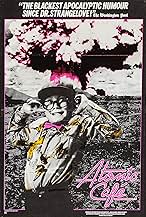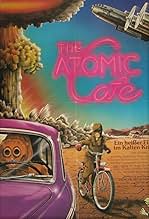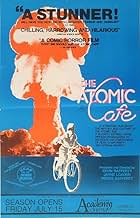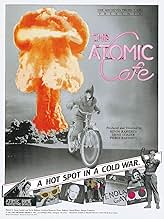VALUTAZIONE IMDb
7,6/10
4726
LA TUA VALUTAZIONE
Aggiungi una trama nella tua linguaDisturbing collection of 1940s and 1950s United States government-issued propaganda films designed to reassure Americans that the atomic bomb was not a threat to their safety.Disturbing collection of 1940s and 1950s United States government-issued propaganda films designed to reassure Americans that the atomic bomb was not a threat to their safety.Disturbing collection of 1940s and 1950s United States government-issued propaganda films designed to reassure Americans that the atomic bomb was not a threat to their safety.
- Nominato ai 1 BAFTA Award
- 2 vittorie e 1 candidatura in totale
Paul Tibbets
- Self
- (filmato d'archivio)
Harry S. Truman
- Self
- (filmato d'archivio)
- (as President Harry S Truman)
W.H.P. Blandy
- Self - Commander of the Bikini Test
- (filmato d'archivio)
- (as Vice Admiral W.H.P. Blandy)
Brien McMahon
- Self
- (filmato d'archivio)
- (as Sen. Brian McMahon)
Lloyd Bentsen
- Self
- (filmato d'archivio)
- (as Rep. Lloyd Bentsen)
Owen Brewster
- Self
- (filmato d'archivio)
- (as Sen. Owen Brewster)
Julius Rosenberg
- Self
- (filmato d'archivio)
Ethel Rosenberg
- Self
- (filmato d'archivio)
Val Peterson
- Self - Director of Civil Defense
- (filmato d'archivio)
- (as Gov. Val Peterson)
Lyndon B. Johnson
- Self
- (filmato d'archivio)
- (as Sen. Lyndon B. Johnson)
Lewis Strauss
- Self - Chairman, Atomic Energy Commission
- (filmato d'archivio)
- (as Lewis L. Strauss)
George Molan
- Self
- (filmato d'archivio)
- (as Cpl. George Molan)
George Portell
- Self
- (filmato d'archivio)
- (as Tech Sgt. George Portell)
Jerry Schneider
- Self
- (filmato d'archivio)
Sergeant Weaver
- Self
- (filmato d'archivio)
Seymour Melman
- Self - Columbia University
- (filmato d'archivio)
- (as Prof. Seymour Melman)
Mario Salvadori
- Self - Columbia University
- (filmato d'archivio)
- (as Prof. Mario Salvadori)
Nikita Khrushchev
- Self
- (filmato d'archivio)
Recensioni in evidenza
An ostensibly tongue in cheek documentary about the nuclear age of the late 40's and 50's, juxtaposing the horrific realities of the arms race with cheery misinformation(and simplistic redbaiting) doled out to the public by the US government and private sector. The overall effect is chilling-for every scene of hilariously misguided propaganda and dismissal of nuclear danger(an army film cheerfully assures a fictional fallout victim that his hair will grow back in no time) there's scenes of Pacific islanders affected by fallout from remote nuclear tests and US soldiers getting debriefed on the minimal dangers of witnessing a nuclear detonation a few miles away(with goggles on, to be fair). Not an objective documentary by any means - not that it should be - the filmmakers excoriate the duplicity of the government and the mock the complacency of the public with equal zeal, but there's a certain absurdist charm to the whole affair.
I saw The Atomic Cafe in a theater when it was first released. Someone exclaimed derogatorily as they walked out on it. But I thought it was brilliant. Sort of a sub-genre of documentary, this one had no commentary, narrative or explanations for the material presented. No retroactive interviews with those who were there. It relied 100% on archival materials.
A few years back, I visited the Trinity Site (here in New Mexico) on the 50th anniversary of the first test of the bomb. Quite a few of those who were somehow involved back then and still living turned up for the event. So I did get to hear some hindsight comments. Definitely different than what was being said back then, and such commentary could have really changed the picture.
This is a rare approach, and therefore thought provoking. One can argue that the choice of material, editing and music track impose some interpretation, and there may be something to that. Although it's unlikely that one could turn the story into something really different unless latter-day, hindsight interviews were added to provide a different spin.
Being a "Baby Boomer", I was born during the times depicted in the movie, and have some early memories of them. For those who were alive in that time, it's fascinating to see how it tweaks your memory. I, for one, didn't think deep thoughts about the "duck and cover" drills at school - it was just another thing that got us out of our seats, like fire drills and recess. But it does tweak memory, to bring back things not thought of for many years. Interesting to consider how one's own memory is incomplete, wanders, can be influenced, etc. (Now, re-read Orwell's 1984.)
Brilliant, and disturbing. Interesting to consider in light of current events (spring 2003).
A few years back, I visited the Trinity Site (here in New Mexico) on the 50th anniversary of the first test of the bomb. Quite a few of those who were somehow involved back then and still living turned up for the event. So I did get to hear some hindsight comments. Definitely different than what was being said back then, and such commentary could have really changed the picture.
This is a rare approach, and therefore thought provoking. One can argue that the choice of material, editing and music track impose some interpretation, and there may be something to that. Although it's unlikely that one could turn the story into something really different unless latter-day, hindsight interviews were added to provide a different spin.
Being a "Baby Boomer", I was born during the times depicted in the movie, and have some early memories of them. For those who were alive in that time, it's fascinating to see how it tweaks your memory. I, for one, didn't think deep thoughts about the "duck and cover" drills at school - it was just another thing that got us out of our seats, like fire drills and recess. But it does tweak memory, to bring back things not thought of for many years. Interesting to consider how one's own memory is incomplete, wanders, can be influenced, etc. (Now, re-read Orwell's 1984.)
Brilliant, and disturbing. Interesting to consider in light of current events (spring 2003).
I could watch this movie again and again. If you remember the days when we were all terrified of impending nuclear war with the Soviet Union, this puts your half-remembered anxieties and prejudices in perspective. There's rare archive footage of the first nuclear bombs being primed and detonated. There's stomach churning archive footage about the execution of the Rosenbergs for espionage. And the now hilarious footage about how civilians should protect themselves against the bomb. Makes fun of politicians and broadcasters, and leaves you feeling that you've learned something and that you won't be fooled again.
The older boomers would recall the atmosphere of this era very well.
The belief that nuclear weapons were probably going to fall at any time was accepted as a matter of course. Coming out of the carnage and rubble of WW2 perhaps that was to be expected, but the PSAs and political leaders honed that message to suggest it was not much more of a concern than a flock of tornadoes. "Duck and Cover" ads, back yard bomb shelters, Conelrad symbols on the radios (AM of course), public fallout shelters in the bank basements and other related markers were given little thought.
Younger folks would get a kick out of the over-simplified logic and ham-handed propaganda and be astonished to think that we took it for granted that nuclear warfare was just a dirty conventional tactic similar to the London Blitz.
It is an informative film and very entertaining in its odd way. Worth a watch for interested parties.
The belief that nuclear weapons were probably going to fall at any time was accepted as a matter of course. Coming out of the carnage and rubble of WW2 perhaps that was to be expected, but the PSAs and political leaders honed that message to suggest it was not much more of a concern than a flock of tornadoes. "Duck and Cover" ads, back yard bomb shelters, Conelrad symbols on the radios (AM of course), public fallout shelters in the bank basements and other related markers were given little thought.
Younger folks would get a kick out of the over-simplified logic and ham-handed propaganda and be astonished to think that we took it for granted that nuclear warfare was just a dirty conventional tactic similar to the London Blitz.
It is an informative film and very entertaining in its odd way. Worth a watch for interested parties.
Watching Atomic Café is like witnessing history repeating, since the scenes are a compilation of bits and pieces from pre-existing films taken from government and education films from the '40s and '50s. As a compilation film, Atomic Café has resulted in a totally new film that is much richer and more meaningful than the sum of its parts.
Atomic Café, will be more understandable if we are familiar with the roots of its historical material. As a history film, Atomic Café takes us to experience three levels of time. The first is the internal time, the Cold War, communism versus the free world, when propaganda about the atomic bomb was made to persuade the people that only nuclear weapons would protect them from the "Evil Empire". The period of the'Nuclear Free' movement comes next. And thirdly, the present time, when the world is changed but has to face the same irony that still is just as relevant today, the fear of weapons of mass destruction.
In the beginning, the film appears to be a straightforward history of America's development and use of atomic weapons. Historical footage is used to add credibility to the information presented. The power of the bomb is demonstrated by showing dramatic footage of the Trinity test; interviews with Bikini Islanders, and preserved eyewitness congressional testimony of atomic bomb veterans. The impact of the weapon is documented through footage of the bomb victims. The intention is not to make us become objective about certain issues, rather it 'is designed to make us question the nature of the information presented' (Freeman Reading Packet, 108).
The film uses unique techniques. It is like a collage that 'sacrifices the conventions of continuity editing and the sense of a very specific location in time and place that follows from it to explore associations and patterns that involve temporal rhythms and spatial juxtaposition' (Nichols, 102). It is all about editing raw material and splicing segments? of military training films, civil defense films, archive footage, interviews, newsreel material, and fifties music. Many sequences are edited to show the most ridiculous side of the duck-and-cover drills and how naïve the Americans were at that time. To make it more derisive the film shows how the military training films were so amateurishly acted and misleading, such as the scene about the beauty of the H-bomb. I believe that the filmmakers have made their point in choosing all the footage for the film. Perhaps the intention is to challenge and deprive the intended message of the original footage.
If we take a look in more detail, Atomic Café chooses and juxtaposes its various elements to support its point-of-view. One of the examples is the continual references to radio receivers. Perhaps it is a symbol that is used to invoke the idea of the power of mass media. The intention is 'to sensitize us to the danger of uncritical media consumption' (Freeman Reading Packet, 110). It is so ironic to see how people in the '50s could be so passive that they believed in every single thing that they heard about the atom bomb on the radio. We can see from the footage how people became so afraid and escaped to their shelter after hearing that a bomb was launched. Perhaps fear had taken such control of these people that the more frightened they were, the more they were easily persuaded.
I guess it would be a great mistake to ignore the political message that is contained in the film. Maybe for some viewers this is just a gimmick about the Cold War and things that happens during the '50's. But really, Atomic Café gives us an historical perspective for reconsidering the effect of the issues of war, nuclear warfare and weapons of mass destruction.
Atomic Café, will be more understandable if we are familiar with the roots of its historical material. As a history film, Atomic Café takes us to experience three levels of time. The first is the internal time, the Cold War, communism versus the free world, when propaganda about the atomic bomb was made to persuade the people that only nuclear weapons would protect them from the "Evil Empire". The period of the'Nuclear Free' movement comes next. And thirdly, the present time, when the world is changed but has to face the same irony that still is just as relevant today, the fear of weapons of mass destruction.
In the beginning, the film appears to be a straightforward history of America's development and use of atomic weapons. Historical footage is used to add credibility to the information presented. The power of the bomb is demonstrated by showing dramatic footage of the Trinity test; interviews with Bikini Islanders, and preserved eyewitness congressional testimony of atomic bomb veterans. The impact of the weapon is documented through footage of the bomb victims. The intention is not to make us become objective about certain issues, rather it 'is designed to make us question the nature of the information presented' (Freeman Reading Packet, 108).
The film uses unique techniques. It is like a collage that 'sacrifices the conventions of continuity editing and the sense of a very specific location in time and place that follows from it to explore associations and patterns that involve temporal rhythms and spatial juxtaposition' (Nichols, 102). It is all about editing raw material and splicing segments? of military training films, civil defense films, archive footage, interviews, newsreel material, and fifties music. Many sequences are edited to show the most ridiculous side of the duck-and-cover drills and how naïve the Americans were at that time. To make it more derisive the film shows how the military training films were so amateurishly acted and misleading, such as the scene about the beauty of the H-bomb. I believe that the filmmakers have made their point in choosing all the footage for the film. Perhaps the intention is to challenge and deprive the intended message of the original footage.
If we take a look in more detail, Atomic Café chooses and juxtaposes its various elements to support its point-of-view. One of the examples is the continual references to radio receivers. Perhaps it is a symbol that is used to invoke the idea of the power of mass media. The intention is 'to sensitize us to the danger of uncritical media consumption' (Freeman Reading Packet, 110). It is so ironic to see how people in the '50s could be so passive that they believed in every single thing that they heard about the atom bomb on the radio. We can see from the footage how people became so afraid and escaped to their shelter after hearing that a bomb was launched. Perhaps fear had taken such control of these people that the more frightened they were, the more they were easily persuaded.
I guess it would be a great mistake to ignore the political message that is contained in the film. Maybe for some viewers this is just a gimmick about the Cold War and things that happens during the '50's. But really, Atomic Café gives us an historical perspective for reconsidering the effect of the issues of war, nuclear warfare and weapons of mass destruction.
Lo sapevi?
- QuizThe segment "Duck and Cover" showed how school children were reassured by "Bert the Turtle" that they would survive a nuclear bomb by simply forming a huddle together by the wall of the school-house. "The Atomic Cafe" has been attributed to raising public consciousness of the short film "Duck and Cover" and introducing it to a whole a new generation.
- Citazioni
Army information film: When not close enough to be killed, the atomic bomb is one of the most beautiful sights in the world.
- Colonne sonoreWhen the Atom Bomb Fell
Written by Karl Victor Davis and Connecticut 'Harty' Taylor
Performed by Karl and Harty
Courtesy of CBS Records, Inc.
I più visti
Accedi per valutare e creare un elenco di titoli salvati per ottenere consigli personalizzati
- How long is The Atomic Cafe?Powered by Alexa
Dettagli
Botteghino
- Budget
- 300.000 USD (previsto)
- Lordo Stati Uniti e Canada
- 22.293 USD
- Fine settimana di apertura Stati Uniti e Canada
- 4098 USD
- 5 ago 2018
- Lordo in tutto il mondo
- 22.293 USD
- Tempo di esecuzione1 ora 26 minuti
- Colore
- Mix di suoni
- Proporzioni
- 1.33 : 1
Contribuisci a questa pagina
Suggerisci una modifica o aggiungi i contenuti mancanti

Divario superiore
By what name was The Atomic Cafe (1982) officially released in Canada in English?
Rispondi




























